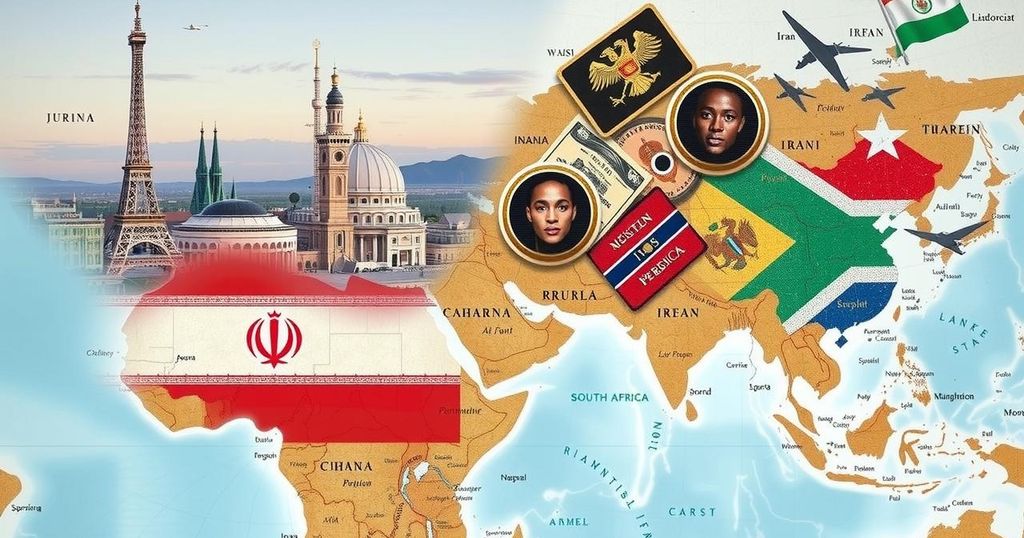Global Developments: Iran’s Economic Crisis, China’s Tourism Expansion, & More
Iran’s rial has reached a record low of 777,000 against the dollar due to economic crises. In contrast, China has extended visa-free travel for tourists, signaling a push for recovery post-COVID. South Africa has closed over 1,000 informal grocery stores due to health risks. Additionally, Russia has arrested a suspect linked to a high-profile assassination, highlighting ongoing tensions with Ukraine.
Iran is currently facing an unprecedented crisis, marked by the staggering depreciation of its currency, the rial, which has plummeted to an all-time low of 777,000 against the dollar. This economic downturn follows a series of calamities, including the setbacks faced by Iran’s primary proxy, Hezbollah, and the loss of crucial alliances in Syria. Moreover, an ongoing energy crisis has compelled the government to close schools and other state facilities, exacerbating the situation.
In a contrasting move, the Chinese Communist Party aims to revitalize tourism amid a recovering global landscape. The government has introduced a 10-day visa-free travel initiative for citizens from 50 countries, including the United States, while passport holders from approximately 40 other nations are entitled to a month-long stay. This policy has attracted a surge in international visitors, with a reported 86% increase in arrivals compared to the previous year, totaling nearly 30 million tourists within the first eleven months.
Meanwhile, the South African administration has closed down 1,041 informal grocery shops, known as spaza shops, following incidents where children succumbed to foodborne illnesses attributed to contaminated goods. Investigations revealed that the pesticides used by shop owners to deter pests inadvertently contaminated the food, resulting in severe health repercussions for consumers.
Lastly, the Russian authorities have apprehended an Uzbek national believed to be involved in the assassination of Lieutenant General Igor Kirillov, a senior military officer. The Federal Security Service of Russia disclosed that the suspect was allegedly offered $100,000 by Ukrainian operatives to execute the attack using an explosive device concealed within a scooter. This incident underscores the escalating tension surrounding military operations and alleged involvement in war crimes, particularly after accusations regarding the extensive use of chemical weapons by Kirillov in Ukraine, post-Russian invasion.
The current geopolitical landscape highlights significant developments in Iran and its economic challenges, particularly the collapse of the rial and the resultant social implications. Concurrently, China’s policy shift towards tourism represents a strategic move to recover economically from the pandemic, reinstating its position as a global tourist destination. In South Africa, the closure of spaza shops due to health concerns reflects the government’s commitment to safeguarding public welfare. Moreover, the assassination of a senior Russian general reveals the high stakes and ongoing tensions within the conflict involving Ukraine and Russia, bringing international scrutiny to military conduct in wartime.
The intertwined narratives emerging from Iran’s economic struggles, China’s tourism initiatives, South Africa’s public health measures, and Russia’s recent arrests reveal the complexities of global dynamics in various regions. Each situation underscores critical challenges faced by nations in response to internal and external pressures, drawing attention to both government accountability and the broader implications of geopolitical tensions.
Original Source: www.gzeromedia.com




Post Comment